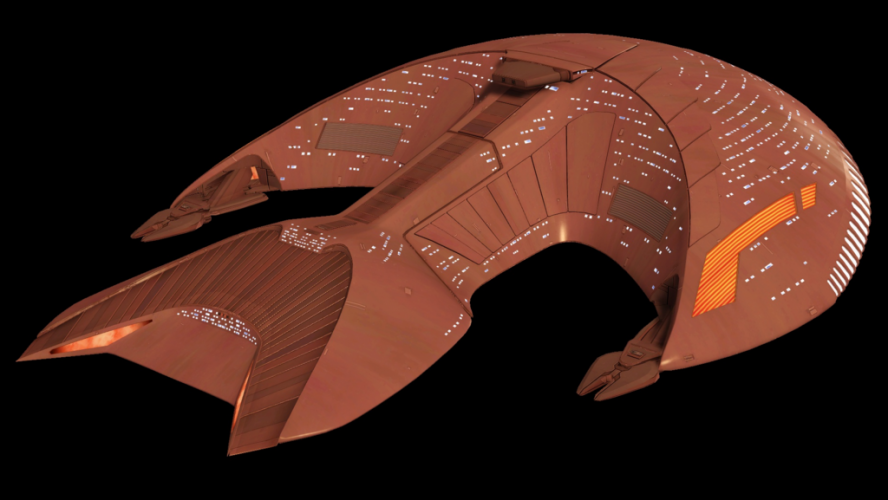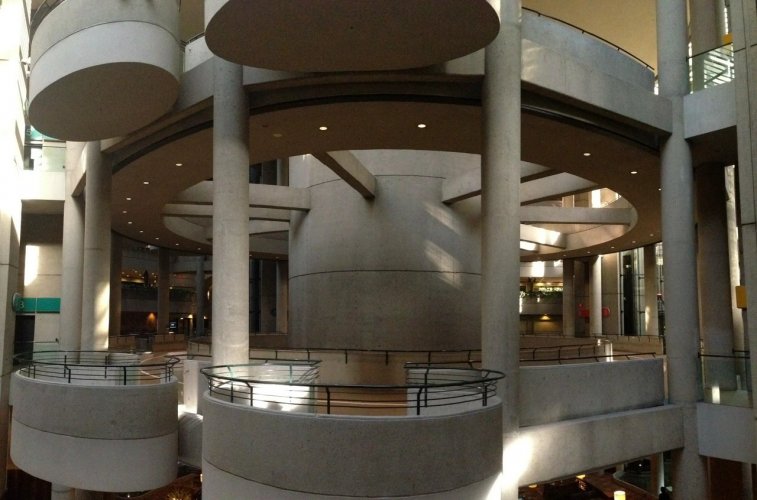The Feds are paranoid about genetic engineering for "improvements" or major changes, but it appears they're ok with genetic tinkering to correct genetic diseases. Not sure how the Vulcans fit into this; they trot out IDIC, but they sure don't engineer *themselves* to be very different. Hell, they mostly all have the same *haircut.*Nah, Federation is extremely paranoid about genetic manipulations and it didn't went well with Vulcan's IDIC.
You are using an out of date browser. It may not display this or other websites correctly.
You should upgrade or use an alternative browser.
You should upgrade or use an alternative browser.
Star Trek Mania
- Thread starter klem
- Start date
- Joined
- 27 September 2006
- Messages
- 6,364
- Reaction score
- 6,682
You are right to point out that the language used is a "Lingua Franca".I hail from a land of non-English as well. Perhaps people like me should strive to become fully conversant in today's lingua franca in this forum...
Had the Net been available in the years up to 1700 we would all have used Church Latin (even Protestants had to).
Between 1700 and 1900 French became the established language between nations.
Germany's role in science, engineering and mathematics meant many international publications were published in German.
Air Travel and US domination of the global entertainment industry plus the global presence of Yanks and Brits from WW2 on have made English the current language of use.
I would add that unlike French and Latin English has been flexible in its grammar and adoption of foreign words and usage.
This is underlined by its use by two large and ancient societies: China and India when dealing with the outside world.
Despite what characters like Picard say, religion is clearly still rampagingly popular in the 25th century. The Bajorans and Klingons, for example, are blisteringly religious; and while humans don't seem all that demonstrative about it, there are clearly still a bunch of human religions. If "tribal" faiths such as Chacotay's are still out there, it's a safe bet that there are Catholics and Mormons and Hindus and such.Yeah, a good way to dealt with such lunacies as religious beliefs, for example)
In reality, there are doubtless *more* religions among humanity. Not only would a bunch of humans adopt alien religions (I'm sure the Vulcan and Klingon religions would have armies of human adherents), humans have Actually Met ACTUAL GODs out there. There is now objective evidence that Apollo & co were real. Q and the like show up weekly. The Organians did their thing. There will be V'Ger worshippers and Whale Probe cultists. The Orange Catholic Church of Borg, Reformed, is doubtless popular.
- Joined
- 27 September 2006
- Messages
- 6,364
- Reaction score
- 6,682
It is interesting to compare Star Trek TOS which reflected the somewhat sniffy attitude to religion I grew up with in the 60s at home and school. It was regarded as "old fashioned" and ignored rather than attacked.
By the 1970s perhaps on the back of Eastern Mysticism (The Beatles were into this amongst many) and a flood of US Christian evangelists this attitude was no longer fashionable.
Picard's galaxy is completely different from Kirk's. One can only speculate on how Harry Mudd would have got on with the Ferengi. Diversity had arrived and that included religious sects.
By the 1970s perhaps on the back of Eastern Mysticism (The Beatles were into this amongst many) and a flood of US Christian evangelists this attitude was no longer fashionable.
Picard's galaxy is completely different from Kirk's. One can only speculate on how Harry Mudd would have got on with the Ferengi. Diversity had arrived and that included religious sects.
Dilandu
I'm dissatisfied, which means, I exist.
So we could safely assume that Federation is not fond of -Despite what characters like Picard say, religion is clearly still rampagingly popular in the 25th century. The Bajorans and Klingons, for example, are blisteringly religious; and while humans don't seem all that demonstrative about it, there are clearly still a bunch of human religions. If "tribal" faiths such as Chacotay's are still out there, it's a safe bet that there are Catholics and Mormons and Hindus and such.
few minutes under the Neural Neutralizer can likely clear it up.
About the popularity of religion in 25th century - if you remove a material greed from religion (no reason to get into your believer's pockets, since most goods are free anyway) and the fear of death (it was stated by Rodenberry, that humans of 25th century view death as sad, but natural course of events, and do not actually fear it anymore), then peoples would likely start to practice religion more as a way of spiritual self-discovery and self-improvement. So there is likely a lot of religious peoples in Federation, but relatively few priests.
- Joined
- 6 November 2010
- Messages
- 5,192
- Reaction score
- 5,341
[Assuming an afterlife] Now you have L. Ron Hubbard spinning in his grave.if you remove a material greed from religion (no reason to get into your believer's pockets, since most goods are free anyway)
Dilandu
I'm dissatisfied, which means, I exist.
...And the Federation scientists immediately invented the way to turn dynamo with Hubbard rotations, thus finally making him useful for a change!Assuming an afterlife] Now you have L. Ron Hubbard spinning in his grave.
So we could safely assume that Federation is not fond of -
Meaning unclear.
About the popularity of religion in 25th century - if you remove a material greed from religion (no reason to get into your believer's pockets, since most goods are free anyway) and the fear of death (it was stated by Rodenberry, that humans of 25th century view death as sad, but natural course of events, and do not actually fear it anymore)
Yeah, he also said that people don't have interpersonal issues anymore, humans don't argue, certainly don't fight, blah, blah, blah. That nonsense didn't last. Witness any scene of impending destruction, and you'll see hordes of crew, passengers, civvies, etc. beating feet to the escape pods because they sure as hell DO fear death. Nobody not a moron doesn't fear death. Look at "Siege of AR-558." Them humans had a good healthy fear of death, cuz they've seen it.
Probably a lot of AI priests., then peoples would likely start to practice religion more as a way of spiritual self-discovery and self-improvement. So there is likely a lot of religious peoples in Federation, but relatively few priests.
Dilandu
I'm dissatisfied, which means, I exist.
Lower Decks are a very rare case of loving desconstruction; they make fun of cliches and weak parts of original, while respecting its spirit.Someone should make a "trek setting but the people are actually people"
"Drop this alien AI, it's heavy!"
"No! It also have right to exist!"
"But he is evil!"
"Yes. But we are Starfleet!"
P.S. The evil AI in question actually changed its ways for good... eventually)
Dilandu
I'm dissatisfied, which means, I exist.
Not being willing to die and fearing death is a different things. I admit, that the borderline is relatively thin, but essentially it could be drawn at rationality. If someone is willing to do anything to get even a totally false hope of avoiding death (like giving his money to strangerly dressed men, who sprout nonsence about talking snakes, winged wheels with eyes, ect.) - then he is fearing death to irrational, instinctive degree.Yeah, he also said that people don't have interpersonal issues anymore, humans don't argue, certainly don't fight, blah, blah, blah. That nonsense didn't last. Witness any scene of impending destruction, and you'll see hordes of crew, passengers, civvies, etc. beating feet to the escape pods because they sure as hell DO fear death. Nobody not a moron doesn't fear death. Look at "Siege of AR-558." Them humans had a good healthy fear of death, cuz they've seen it.
The idea is even more dangerous for mounted units. In 1937 the mule that my father was riding was upset when he was wounded and threw its rider who fell backwards on his rifle. By incredible luck, Artillery Sergeant Manuel Miranda fell into a deep stream and lived to procreate.With most women's waists, a pistol on the belt is difficult to draw. A shoulder holster is better for curvy women.
Also, a pistol across the spine is a terrible idea. You land flat on your back and you'll never walk again.
Attachments
Not being willing to die and fearing death is a different things. I admit, that the borderline is relatively thin, but essentially it could be drawn at rationality.
Other than showing Klingons being overly jazzed about the chance to die entertainingly, Star Trek's depictions of people facing death are not terribly different than *non* Star Trek depictions of people facing death.
Actual humans today:
1) generally know that death is a natural, inevitable part of life
2) generally believe in an afterlife
3) Generally seem to believe that they themselves are bound towards a "better world" in that afterlife
And yet, knowing that, people today are scared to death of death. What would people in Star Trek world have discovered that would make them suddenly, after a hundred thousand years of humanity having a healthy fear of death, suddenly not fear it anymore? The black mountain? The koala?
- Joined
- 6 November 2010
- Messages
- 5,192
- Reaction score
- 5,341
Proof of access to an afterlife that looks desirable.What would people in Star Trek world have discovered that would make them suddenly, after a hundred thousand years of humanity having a healthy fear of death, suddenly not fear it anymore?
Mark Twain wrote a story where hell (entertaining) was a better place than heaven (boring), so YMMV.
Personal heaven or hell? Ideologically or religiously segregated afterlife? An opt-out when immortality proves to be unbearable?
Dilandu
I'm dissatisfied, which means, I exist.
The second and third is essentially our attempts to rationalize our own mortality, born out of self-preservation instincst of primates. Since we did not exactly have instincts, but still have self-preservation fears, we attempt to rationalize them into existence of afterlife. And religions discovered that it's a great way of getting into other peoples pockets, by playing on their fear of death. No pockets to steal from (i.e. a post-scarity future) - significanly less interest from religion to play with people's fears. And if religions lost interest in scaring peoples, it would stand to reason that peoples would simply outlive the fear itself.2) generally believe in an afterlife
3) Generally seem to believe that they themselves are bound towards a "better world" in that afterlife
Post scarcity doesnt mean no pockets. Replicators cant make land, for instance. Or provide services. There will always be an economy.. No pockets to steal from (i.e. a post-scarity future)
The universe of Star Trek is DAMN scary,from mundane threats like Klingons and pirates to Borg, Doomsday Machines, Vger, space "gods" of all kinds, other universes invading, time travel warfare, etc. Religions will find fertile ground.- significanly less interest from religion to play with people's fears. And if religions lost interest in scaring peoples, it would stand to reason that peoples would simply outlive the fear itself.
shin_getter
ACCESS: Top Secret
- Joined
- 1 June 2019
- Messages
- 1,080
- Reaction score
- 1,449
Now that you list it out like that, Star Trek seems like a very "Roman" setting.The universe of Star Trek is DAMN scary,from mundane threats like Klingons and pirates to Borg, Doomsday Machines, Vger, space "gods" of all kinds, other universes invading, time travel warfare, etc. Religions will find fertile ground.
Its not superstition if gods are really out there ready to smite down people that wronged them.
Polytheism roughly is a single belief system and relationships with powerful beings is diplomacy, not "religion." I guess "religion" is practically a insult against belief systems that is based on the unobservable.
Transporter accidentWhat would people in Star Trek world have discovered that would make them suddenly, after a hundred thousand years of humanity having a healthy fear of death, suddenly not fear it anymore?
But really, mortality in a world of perfect transporter clones is just bizarre. Any non-stupid application of the tech would have people running dozens of clones and backups and so on in an afternoon.
Now that you list it out like that, Star Trek seems like a very "Roman" setting.
Its not superstition if gods are really out there ready to smite down people that wronged them.
And in Star Trek, there are a LOT of "gods." Their interactions with each other remain unexplored outside of beta canon.
So far in alpha canon it seem that the only reason why humanity/the Federation haven't been smited by some god or other is some combo of dumb luck and that we're still too small to be noticed.
I suspect there are laws against just that sort of thing. Plus: we only see the episodes that feature "successful" transporter cloning. Perhaps, just offscreen, transpo-clones are an hourly occurrence, but they virtually always result in the clone not being just messed up, but horrifically so. Imagine the transporter accident from TMP was a regular result when someone tries to make a clone.But really, mortality in a world of perfect transporter clones is just bizarre. Any non-stupid application of the tech would have people running dozens of clones and backups and so on in an afternoon.
Scott Kenny
ACCESS: USAP
- Joined
- 15 May 2023
- Messages
- 11,064
- Reaction score
- 13,280
There is a significant difference between "not thinking like you" and "actively wishing for the destruction of your existing society"And since Federation clearly allows a significant level of political dissent (all those "weird colonies" that Picard & Co visited constantly), we could safely assume that Federation did not like to brainwash its citizens unless they are truly unrepetant criminal types.
- Joined
- 6 November 2010
- Messages
- 5,192
- Reaction score
- 5,341
Those would be two data points between which dissent crosses the line into "the regime deals with this by surveillance, harassment, fines, incarceration, torture, reprogramming and/or death". Where this line lies, and which sanctions are chosen for which infractions, is the regime's decision.
"The needs of the many outweigh the needs of the few" can have nasty consequences.
"The needs of the many outweigh the needs of the few" can have nasty consequences.
Last edited:
Rhinocrates
ACCESS: Top Secret
- Joined
- 26 September 2006
- Messages
- 2,973
- Reaction score
- 7,516
Possibly like one of John Portman's atrium hotels. This is the San Francisco Hyatt Regency.Ferengi d-kora class star shipI .
I wonder how many shops or warehouses they had on the ship itself.
It somehow looks to me like it was built in the style of an 80s skyscraper by the designers of the NG series View attachment 765362
Attachments
Rhinocrates
ACCESS: Top Secret
- Joined
- 26 September 2006
- Messages
- 2,973
- Reaction score
- 7,516
Dilandu
I'm dissatisfied, which means, I exist.
Most of which got defeated by humans when they started to misbehave. It's more an argumet against being religious in Star Trek universe; the god you worship may very well turns out to be sufficiently advanced alien bratty manchind, who got his ass already kicked by Enterprise crew.And in Star Trek, there are a LOT of "gods." Their interactions with each other remain unexplored outside of beta canon.
A lot of 'em *didn't,* though. The Metrons, Organians, Thasians, V-Ger, Whale Probe, Prophets, Trelane's folks, Nagilum, Douwd, Caretaker, cosmic Koala... these folks showed up, did their thing and were *not* defeated by Our Heroes. Often enough they simply used the crew for whatever purpose then lost interest or were finished with that purpose and wandered off.Most of which got defeated by humans when they started to misbehave. It's more an argumet against being religious in Star Trek universe; the god you worship may very well turns out to be sufficiently advanced alien bratty manchind, who got his ass already kicked by Enterprise crew.
Actually *beating* the gods, like Apollo or arguably sometimes Q, was a rarity.
Given that people today like to worship ephemeral and minimally talented celebrities, worshiping or just following even the lamest of the Star Trekkian gods seems entirely likely.
Dilandu
I'm dissatisfied, which means, I exist.
Usually the ones that weren't acting like total jerks. Anyway, the concept of gods as merely "sufficiently advances aliens" kinda undermine the whole concept of religion; you can never be sure that more advanced alien wouldn't appear and chase your "god" away. Human irrationality also have limits; god-like beings running around (and sometimes being kicked for being a jerks by mere mortals) would likely dissuade most peoples from believing in any gods (or at very least from letting any priest into their pockets)A lot of 'em *didn't,* though. The Metrons, Organians, Thasians, V-Ger, Whale Probe, Prophets, Trelane's folks, Nagilum, Douwd, Caretaker, cosmic Koala... these folks showed up, did their thing and were *not* defeated by Our Heroes
the concept of gods as merely "sufficiently advances aliens" kinda undermine the whole concept of religion
I dunno... cargo cults seemed to do well enough there for a while.
At least twice ("Way to Eden" and STV) Trek showed people rather easily following cult leaders. Dukat become a follower of the Pah Wraiths, knowing full well what they were. In the present day there are at least a few "religions" based on friggen' UFOs. Somebody displaying *actual* godlike power, even if that power can be matched by a fully charged phaser bank, is doubtless going to make a *lot* of people go weak in the knees.Human irrationality also have limits; god-like beings running around (and sometimes being kicked for being a jerks by mere mortals) would likely dissuade most peoples from believing in any gods (or at very least from letting any priest into their pockets)
I can see a story being written about a new religion formed around Reginald Barclay. He ascended to godhood and came back to us mere mortals, then saw visions in the transporter cycle.
Dilandu
I'm dissatisfied, which means, I exist.
I agree, that there alwasy would be some peoples irrational (or just plainly stupid) enough to believe in anything. But any large-scale organized religion would be kinda hard to run in thd situation, when the core beliefs could be always threatened to be disproved. Just imagine, that someone belived in Holy Abracadabra the Greatest, who would someday return on his shining chariot and took the faithful souls to Heaven - and then it become apparent, that Abracadabra was merely an alien researcher, who spend some time on ancient Earth, all his "wonders" were just products of tehnology, not even very advanced, and all his "mystical words of wisdom" were just poorly translated and misunderstood mundane advices (like "the unclean heretics must be drown in His Holy Water before the day of Great Feast, to stop the plague of doubt from spreading" was initially "wash your hands before eaing, to prevent disease spread"). Would this someone be eager to follow some other religion after such revelation?At least twice ("Way to Eden" and STV) Trek showed people rather easily following cult leaders. Dukat become a follower of the Pah Wraiths, knowing full well what they were. In the present day there are at least a few "religions" based on friggen' UFOs. Somebody displaying *actual* godlike power, even if that power can be matched by a fully charged phaser bank, is doubtless going to make a *lot* of people go weak in the knees.
A challenge: explain to some current day zealot that the founder of his faith was, rather than a prophet of the one true god who got The Truth told to him directly by an angel, was in reality a murderous schizo. That explanation is quite satisfactory to explain the whole deal and makes more sense than the religious one. See how far that gets you on convincing said zealot to abandon said religion and take up a life of Vulcan-like reason and rationality and non-violence.Would this someone be eager to follow some other religion after such revelation?
Nah. People will believe what they've been raised to believe, what makes sense to them, what they like, what fills some dark little hole in their heart. I'm sure there are more than a few Federation citizens out there running replicating photon grenades in order to take out Zyblort-brand flying cars because a couple of idiots on the Federation Council have decided that Mervin Zyblort's comments about "gee, it'd be nice if people were better" means that he's a follower of Khan Noonian Singh and wants to enact a new regime of eugenics programs on the public. People are gonna believe all manner of stupid insane shit no matter how advanced their technology, how deep the science knowledge of their society, no matter how diverse the cultures available to them. If events of today are any guide to go by, you introduce multiple cultures and get them to mix, you'll get a *lot* of the natives of the more advanced, more scientifically knowledgeable, more reasonable and basically *better* culture will decide to convert to the ways of the crappier culture.
Bruno Anthony
I miss the Cold War
- Joined
- 5 August 2012
- Messages
- 630
- Reaction score
- 623
Picard’s galaxy sucked.Picard's galaxy is completely different from Kirk's.
His Federation sucked.
His Starfleet sucked.
shin_getter
ACCESS: Top Secret
- Joined
- 1 June 2019
- Messages
- 1,080
- Reaction score
- 1,449
You can "believe" anything if you believe in believing it result in probability of personal gain that out weight the costs. Pascals wager is the right mentality.I agree, that there alwasy would be some peoples irrational (or just plainly stupid) enough to believe in anything. But any large-scale organized religion would be kinda hard to run in thd situation, when the core beliefs could be always threatened to be disproved.
People believe in god as a hedge against hell and as a ready made means of generating social capital. As bad as churches and temples can be, the social networks out of that is still much more useful than, say, social media partially to "true believers" doing the work of maintaining commons.
Well, online spaces do have true believers controlling the space, however the (new) religions is no less insane and does not have its edges filed off from evolutionary pressures.
You can't derived a ought out of a what. Utilitarianism is emotionally meaningless to most and offers its believers nothing in terms of "utility" while other "modern/po-mo" belief complexes are equally nonfunctional. From that perspective there is no clearly superior system.more scientifically knowledgeable, more reasonable and basically *better* culture will decide to convert to the ways of the crappier culture.
However an "adaptive" memeplex can be created, like how monotheism managed to sweep the environment. Trek is imo pretty boring because it only have old ideas instead of a glimpse of what the future ought to look like cyberpunk.
Scott Kenny
ACCESS: USAP
- Joined
- 15 May 2023
- Messages
- 11,064
- Reaction score
- 13,280
The Greek Gods were occasionally kicked for being a jerk by mere mortals. Their beliefs still managed to last over a thousand years here on Earth.Usually the ones that weren't acting like total jerks. Anyway, the concept of gods as merely "sufficiently advances aliens" kinda undermine the whole concept of religion; you can never be sure that more advanced alien wouldn't appear and chase your "god" away. Human irrationality also have limits; god-like beings running around (and sometimes being kicked for being a jerks by mere mortals) would likely dissuade most peoples from believing in any gods (or at very least from letting any priest into their pockets)
You think that cyberpunk is what the future should look like? My dude, please seek therapy!Trek is imo pretty boring because it only have old ideas instead of a glimpse of what the future ought to look like cyberpunk.
Cyberpunk is an example of what the world would look like if corporations became more powerful than superpower countries.
Not speaking for others, but "should" could mean "this is morally right" or it could mean "if current trends continue, it should end up like this."You think that cyberpunk is what the future should look like? My dude, please seek therapy!
Trek has the problem that with that tech level, humans should all be either low tech Amish or transcendent Transhumanists by that point, digital entities in the cloud or godlike robobodies. But that's not fun storytelling. We want tales of baseline humans operaing out among the stars.
Similar threads
-
-
Cold War hero Francis Gary Powers receives posthumous Silver Star
- Started by Stargazer
- Replies: 0
-
-
Nasa's and DARPA's Hundred Year Starship
- Started by bobbymike
- Replies: 8
-
Retired U.S. general on how to handle IS and why we lost in Iraq, Afghanistan
- Started by Triton
- Replies: 3







